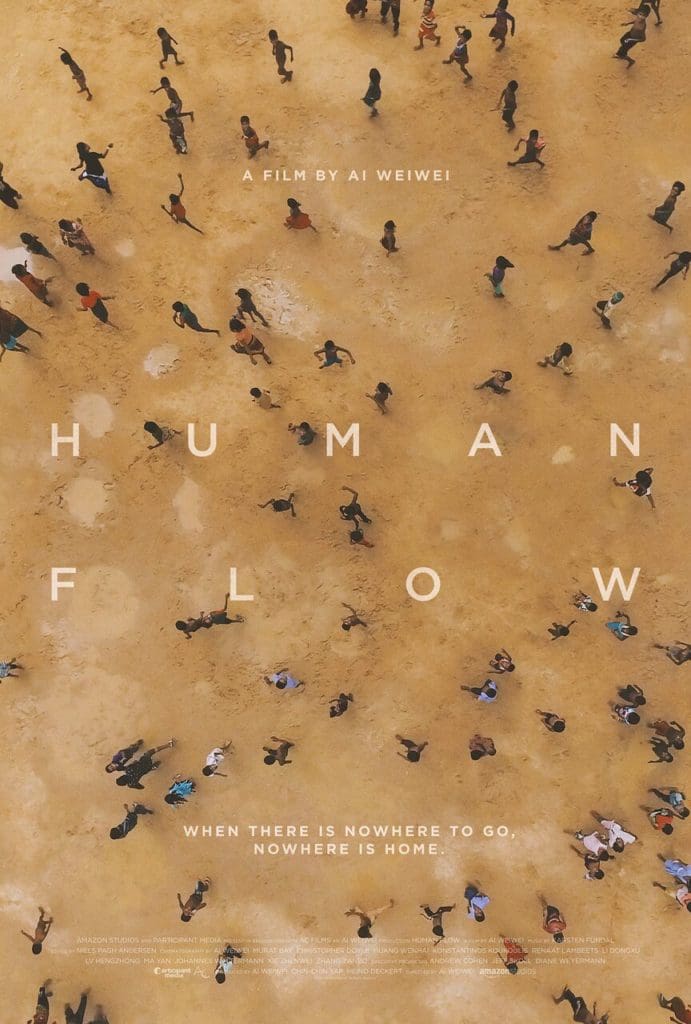Early in Chinese director Ai Weiwei’s new documentary on the world refugee crisis, Human Flow, Jordanian Princess Dana Firas says our humanity must guide our actions. The concept seems simple, but over the two hours and twenty minutes over which the film unfolds, it seems as if the whole world has forgotten.
Granted, that isn’t necessarily Ai’s intention. In fact, he seems determined to restore the humanity taken from his subjects by their dehumanizing conditions. The words “refugee” and “immigrant” have been used so much in the last few years that it can be difficult to remember the struggling individuals they represent. Ai forces us to see the people behind the politicization. In some ways, he does this visually. The director (and some 2,000 crew members in 23 countries) uses drones throughout, first showing us the size and scale of the various groups of refugees he follows before zooming in. At first, he restricts those shots to still, long takes of people staring directly into the camera. It’s confrontational–to say the least–and feels like a dare to forget that these groups are made of real people, each with their own story.
Some of the recent discussion around refugees (particularly in the U.S. and UK) has centered on the security risks in accepting displaced people. However, in telling their stories and showing how dangerous their journey can often be, Ai renders that argument almost ridiculous. The people he films aren’t would-be terrorists or faceless masses bent on draining countries of their resources. They’re just people who risked everything in order to improve their lives. Take the man who, along with 16 other members of his family, left his home by boat only for five of them to die—some before they’d even reached land. Or the woman (who we only see from behind) who is so upset by her family’s conditions and so terrified for their future, that she vomits mid-interview.
There is, indeed, something sickening in seeing how horrible the conditions are for refugees across the globe, but even worse is the realization of how callous we all seem to be in the face of it. While watching police or military personnel fire smoke bombs into refugee camps or burn down their makeshift dwellings is shocking and upsetting, perhaps one of the most effective moments in the film comes thanks to a tiger named Laziz. As the man who took care of him in a Gaza zoo explains, multiple countries and organizations worked together to relocate Laziz to Johannesburg, South Africa because the animal’s life was more important than the red tape. So why can’t we do the same for human beings?
It’s one of many incidents that contribute to the slow, steady sense of indignation that builds throughout and–particularly for any Americans watching– it can quickly morph into a queasy sense of shame. Though Ai doesn’t specifically call out America’s treatment of refugees until a brief section on Mexico relatively late in the film, its role in causing mass migration in a number of the countries is felt throughout. As we watch apocalyptic images of burning oil fields in Iraq or hear how destabilization in Afghanistan has created ripe conditions for radicalization, it’s impossible not to think of the wars started by the second Bush administration or even President Trump’s recent decisions about America’s future involvement in Afghanistan. The emotions it sparks are complex, to say the least, and you almost want Ai to be harsher or less circumspect in his criticism.
Human Flow is not an easy film to watch. It feels like an accusation, a condemnation. It’s difficult–perhaps impossible–to watch all that human suffering and not wonder if future generations will look back at us and ask, “Why didn’t they do anything?” In fact, it’s impossible not to watch the film and ask, “Why aren’t we doing anything.” However, Ai Weiwei (who was displaced himself as a child) clearly hopes that he can spur us into action. Yet even as he humanizes the anonymous migrant masses that have become so politicized across the world, he also makes it clear exactly how poorly people can treat each other. It’s enough to inspire hopelessness as much as anger and action. Despite the director’s more altruistic goals, when all is said and done, it’s hard believe we have enough humanity left to save ourselves.
Rating: 8.5/10


